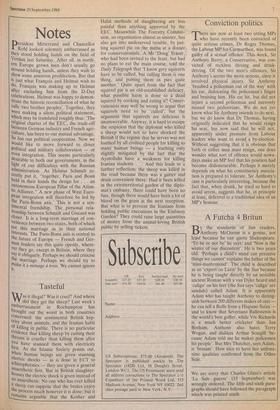Notes
President Mitterrand and Chancellor Kohl looked solemnly embarrassed as they stood holding hands on the field of Verdun last Saturday. After all, in north-, ern Europe grown men don't usually go around holding hands, unless they wish to Show some amorous predilection. But that is just what Francois and Helmut wish to do, Francois was making up to Helmut after excluding him from the D-Day celebrations. Helmut was happy to demon- strate the historic reconciliation of what he calls 'two brother peoples'. Together, they were making a silent political statement, which may be translated roughly thus: 'The original charter of the EEC, the trade-off between German industry and French agri- culture, has been to our mutual advantage. So has our political cooperation. Now we would like to move forward to closer political and military collaboration — or even integration. This seems particularly desirable to both our governments, in the light of our difficulties with the Russian administration. As Helmut Schmidt re- cently put it, "together, Paris and Bonn hold in their hands the design for . . . an autonomous European Pillar of the Atlan- tic Alliance." A new phase of West Euro- pean integration will therefore be led by the Paris-Bonn axis.' This is not a sen- timental friendship. The personal rela- tionship between Schmidt and Giscard was closer. It is a long-term marriage of con- venience between two states, both of which see this marriage as in their national Interests. The Paris-Bonn axis is central to the future of Europe — French and Ger- man leaders say this quite openly, where- ver they go, except in Britain, where they say it obliquely. Perhaps we should criticise the marriage. Perhaps we should try to make it a menage a trois. We cannot ignore n.














































 Previous page
Previous page